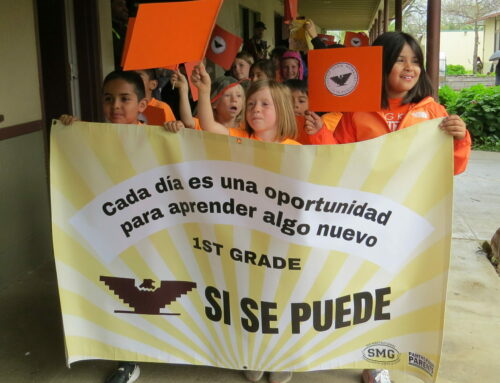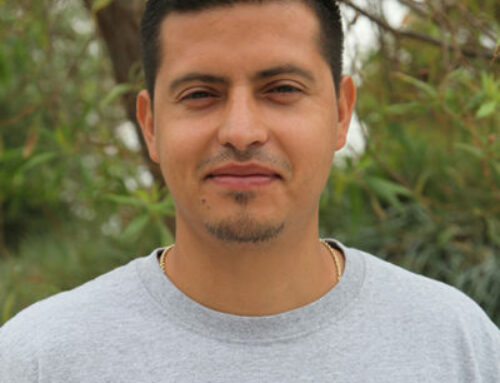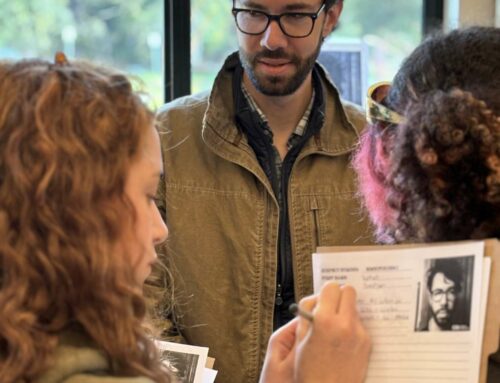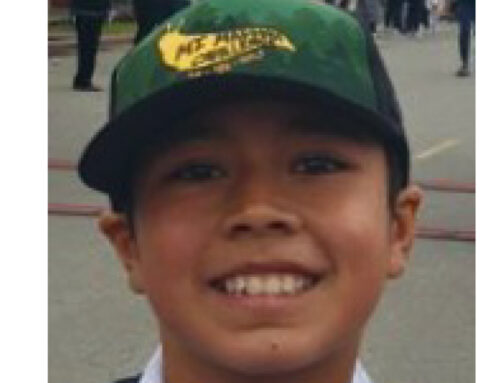Film crew spent several days at the school site
Published in the November 25 – December 8, 2015 issue of Morgan Hill Life
By Marty Cheek

Photo by Marty Cheek
Eight grade students Shane Sawyer, left, and Aiden Schilling, demonstrate an experiment using soap bubbles and dry ice at a recent open house at Charter School of Morgan Hill.
Charter School of Morgan Hill found itself the focus of a new television program now being made by a team of South Korean filmmakers working on a documentary project for that nation’s public education station.
The film crew traveled to various countries last month for the video production and spent several days at the Charter School of Morgan Hill campus on Monterey Road near Bernal Road in south San Jose. They video-recorded interviews with staff and parents as well as teachers interacting with students for footage for the TV show which focuses on project-based learning style of instruction in schools.
“Korea at this moment is trying to change its education system,” said Heather Lee, program coordinator with the Seoul-based Education Broadcast System. “Our TV station is a public education station — much like your PBS. We want to educate people in Korea what PBL is. We researched the project-based learning model not just in the United States but in the world. One person recommended this school as a very good PBL school and that’s why we came.”
South Korea uses a “traditional” style in its learning system at schools, she said. It focuses on textbook learning and getting good grades. However, now there is a growing interest in using project-based learning models to develop social and communication skills as well as creative problem-solving ability.
“The traditional schools are why we have a lot of students losing the taste of the study,” Lee said. “They only focus on the score to get into a good (college). In the 21st century, a good score doesn’t mean a good person.”

Photo by Marty Cheek
A Korean film crew spent several days at Charter School of Morgan Hill. The show will be broadcast on South Korea’s equivalent of America’s Public Broadcasting System educational station.
Unlike traditional classroom lecture style, project-based learning creates a dynamic classroom approach in which students actively participate in exploring real-world problems and challenges. The focus is to acquire a deeper knowledge by actively participating in the learning rather than just studying a textbook and listening to the teacher present a lesson.
“With project-based learning, we learned that the teacher is very important,” Lee said. “They need to prepare themselves to teach the students and consider what to teach them. The better the teacher designs the lesson, the more the students are engaged in learning and more excited about it.”
Filmmaker Han Song Hee said he learned many new facts about project-based learning during his days at Charter School of Morgan Hill and saw that it provides a good classroom environment where students enjoy the process of learning.
“He is surprised that all subjects apply to PBL, even from small (kindergarten) ages to junior high ages,” Han said through Lee’s translation. “All different kinds of PBL can be implemented into all subjects. The teacher needs to be excellent and design different ways to teach the students. He feels that young people look happy and have a lot of fun learning compared to students in Korea. In Korea, students seem bored in the classroom. Also, they study more in private lessons after school — even in elementary school.”
People in Korea know about project-based learning, but students still study by the textbook and often spend long hours doing homework so that when they get into the classroom they feel tired, Han said.
“We want to educate parents (with the film) and encourage them to consider PBL,” he said. “Parents think it’s playing and not studying because the kids are talking and making something. Parents think that nothing is learned from those activities. PBL is going to be 21st century educating, not only in the United States but across the world. Our country has to change to the 21st century education paradigm.”
American schools are now making a shift to Common Core curriculum, and project-based learning methods of teaching can be implemented into this education movement, he said.
“America has now Common Core standards which is why a lot of schools are adopting the PBL standard of learning,” he said. “That is very important. I think Korea has to change the policy of the educator.”
Because PBL is not a policy of education in Korea, teachers in that country are afraid to incorporate it into their classroom environment. Hee hopes that his film documentary will help the Korean government shift is policy of education toward project-based learning based on the results that Charter School of Morgan Hill is achieving.
“He saw that Charter School is going to be a good model to equalize the people’s education and change the education system,” he said through Lee’s translation. “He thinks it is a very good school here and the teachers are excellent and the teaching in school, the PBL, are excellent. The classes of students learn very well.”
Charter School of Morgan Hill parent Amy McElroy has two children who have learned much from the techniques of project-based learning including her eight-grader daughter Hannah who has gone through the school since starting in kindergarten.
“The project-based learning has been really beneficial for her because the typical standard rote type of learning day after day kind of thing gets boring really fast,” McElroy said. “She’s much more creative. She likes to write stories. She’s very musical, likes to write songs, and likes those kinds of opportunities to create skits and plays.”
For example, in an English class Hannah is now taking, the students read a book and then the teacher asks them to take the material from the book and explain it by writing a poem or do an art collage and share these with the entire class. This helps build her social skills where she has to work with other people and learn to compromise and listen to other people’s ideas, McElroy said.
“Just having those options is really good for her rather than just having this strict assignment,” she said. “Having choices and options, and not having the rigid structure, has been really good for her and given her a chance to exercise her creativity.”
Susan Pfefferlen, principal of Charter School, said the Korean filmmakers were impressed with what they saw while filming in the classrooms.
“They spent two days on our campus so they got a good feel of the whole school and kind of what goes on,” she said. “They shadowed a fifth grade class from the beginning of the day to the end and kind of got an opportunity to see what projects they are working on. They visited all the different teachers and got to see what enrichment that go on.”
One thing that the filmmakers learned is that they didn’t truly understood project-based learning at first, she said. When they first came to Charter School of Morgan Hill, they said they wanted to see the PBL class. They did not understand that PBL is a methodology and it’s integrated into all of the classrooms on the campus.
“I think they really developed an understanding for what PBL is and how it’s weaved into the curriculum of all different subject matters,” Pfefferlen said. “They visited other schools and, in comparison, they said that our students are very happy and healthy.”
With Charter School serving as an early implementer of PBL, other schools in the Morgan Hill Unified School District have implemented PBL learning techniques into their teaching methods. These include the focus schools such as Jackson Academy of Math and Music, P.A. Walsh STEAM Academy, and San Martin/Gwinn Environmental Science Academy.
“When we first opened, project-based learning wasn’t really well known and it was even a bit controversial. And now it’s really proven the test of time,” she said. “It’s just been a such an easy transition to the Common Core style of learning, and so now other (schools) are looking at us and saying, ‘It looks like what you’re doing is working and more and more schools are investigating it and trying it out and going down that path.’”
Parent engagement is another aspect of the success of project-based learning at Charter School, she said. The school relies on parent experts who come in and talk to the students about different subject or help in a variety of ways with the various projects students are working on.
“I think it engages kids. It provides them with excitement,” Pfefferlen said. “They look forward to coming to school every day, especially when projects are meaningful and related to real life.”
The projects also help students to develop skills in working together to figure out the solution to problems or create something artistic, she said.
“They’ve developed those collaboration skills, those problem solving skills, because life is not always easy,” she said. “You don’t always have a group where everyone pulls their own weight. That mirrors real-life scenarios — learning to work with others and do your fair share and work it out.”






